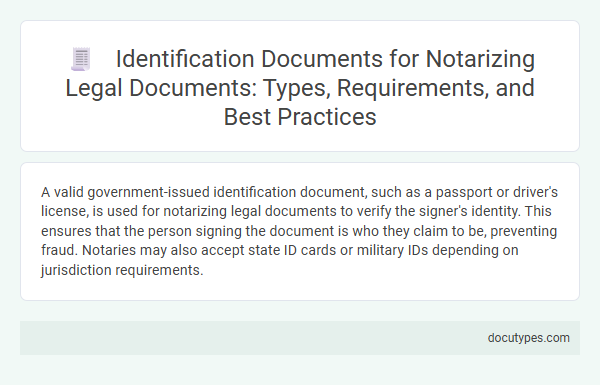A valid government-issued identification document, such as a passport or driver's license, is used for notarizing legal documents to verify the signer's identity. This ensures that the person signing the document is who they claim to be, preventing fraud. Notaries may also accept state ID cards or military IDs depending on jurisdiction requirements.
Introduction to Identification Documents in Notarization
Identification documents play a crucial role in notarizing legal documents, ensuring authenticity and preventing fraud. These documents confirm the signer's identity before a notary public can validate a transaction.
- Government-issued ID - Common forms like passports or driver's licenses provide reliable proof of identity.
- Photo identification - Must include a clear photograph and personal details matching the signer.
- Non-expired status - Validity of the identification document is essential for the notarization to proceed.
Your proper identification helps maintain the integrity and legality of notarized documents.
Importance of Proper Identification for Notarial Acts
What identification document is used for notarizing legal documents? Proper identification is crucial to verify the signer's identity and maintain the integrity of the notarization process. You must present a government-issued ID, such as a passport or driver's license, to ensure the document's legitimacy.
Commonly Accepted Identification Documents
Commonly accepted identification documents for notarizing legal documents include government-issued photo IDs such as a driver's license, state ID card, or passport. These documents must be valid, unexpired, and contain a clear photograph and signature of the individual. Notaries require these IDs to verify the identity of the signer and prevent fraud during the notarization process.
Government-Issued Photo IDs: Standards and Examples
Government-issued photo IDs are the most commonly accepted forms of identification when notarizing legal documents. Your identity must be verified using accurate and standardized documents to ensure the legitimacy of the notarization process.
- State Driver's License - A widely accepted ID featuring a photo, name, and expiration date issued by the state government.
- United States Passport - A federal ID containing a photograph, full name, and nationality, valid for identification nationwide.
- State Identification Card - An alternative to a driver's license offering similar photo and personal data verification issued by state authorities.
Alternative Forms of Identification in Notarization
| Identification Document | Purpose in Notarization | Alternative Forms | Key Requirements |
|---|---|---|---|
| Government-Issued Photo ID | Primary document to verify signer's identity | Driver's license, passport, state ID card | Must be current, contain a clear photo, signature, and physical description |
| Military ID Card | Used to establish identity for active or retired military personnel | Common Access Card (CAC), Military Dependent ID | Must be official, unexpired, and include photo and signature |
| Permanent Resident Card (Green Card) | Accepted to confirm lawful residency and identity | Alien Registration Card | Valid card with photo and personal information |
| Alternative Identification | Used when standard IDs are unavailable or insufficient | Utility bills, Social Security card, bank statements paired with a credible witness | Generally requires multiple forms or a credible witness known to the notary |
| Credible Witness | Serves to confirm the signer's identity without primary ID | Person personally known to the notary or identified through other documents | Must take an oath or affirmation and be personally known or identified by official ID |
Requirements for Valid Identification Documents
Identification documents used for notarizing legal documents must meet strict validity criteria to ensure authenticity and prevent fraud. Valid identification verifies the signer's identity, citizenship or residency, and fulfills legal standards set by notarial laws.
- Government-Issued ID Required - Only government-issued photo IDs such as passports, driver's licenses, or state ID cards are accepted as valid identification for notarization.
- Current and Unexpired - Identification documents must be current and not expired to confirm the identity of the individual at the time of notarization.
- Clear Photo and Signature - The ID must have a clear photograph and a visible signature to allow the notary to accurately verify the signer's identity.
Special Considerations: Expired or Foreign IDs
Identification documents used for notarizing legal documents must be valid and government-issued to verify the signer's identity accurately. Common acceptable IDs include passports, driver's licenses, and state-issued identification cards.
Expired identification is generally not accepted because it does not confirm current identity status, posing risks for legal authenticity. Foreign IDs may be accepted if they contain a photograph, signature, and are considered reliable by the notary's jurisdiction. Notaries often require additional verification steps or supplemental documents when dealing with foreign or expired IDs to ensure compliance with local laws.
Methods for Verifying Identity in Notarial Procedures
Identification documents used for notarizing legal documents primarily include government-issued IDs such as passports, driver's licenses, and state ID cards. These documents provide critical information including a photo, signature, and personal details that help verify the identity of the signer.
Notarial procedures rely on methods such as physical comparison of the ID to the signer, verification of a credible witness, and sometimes biometric verification. Electronic notarization may incorporate digital ID verification tools and secure identity databases to enhance accuracy and trustworthiness.
Best Practices for Notaries When Handling IDs
A valid government-issued identification document is essential for notarizing legal documents. Commonly accepted forms include a driver's license, passport, or state ID card.
Best practices for notaries when handling IDs involve carefully verifying the authenticity of the document. You should always check for expiration dates and ensure the photo matches the signer's appearance.
What Identification Document Is Used for Notarizing Legal Documents? Infographic

